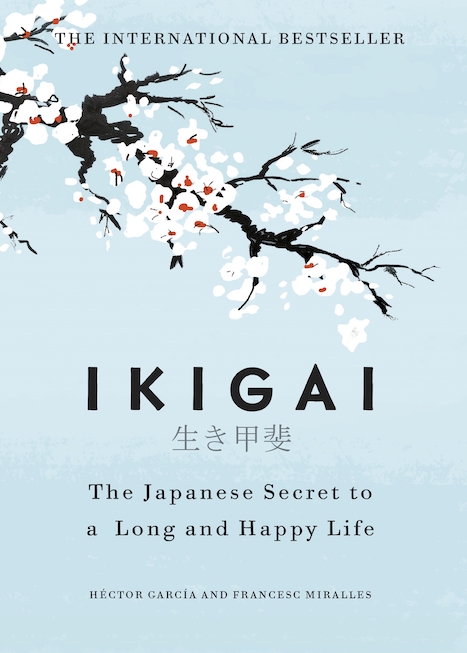Ikigai
Published on May 16, 2021
Personal thoughts for Ikigai: The Japanese Secret to a Long and Happy Life
Review

I found the book's cover illustration captivating. Sadly, I can't say I felt the same for the rest of the book. While the authors did introduce numerous interesting concepts, they did not explore the concepts in a depth which was meaningful. Instead, they jumped far too quickly from one concept to another, covering each concept superficially. As such, the book felt like a list of fun facts. It was a pity given how many concepts introduced could have been starters for insightful discourse.
That being said, I still penned a personal reflection on the book. That's because parts of it were still thought provoking for me. In this document, you'll find some of these thoughts. They are the ones I am comfortable sharing. They are also my biggest takeaways from the book.
Reason for being
- In Okinawa, a blue zone, there is no word for retirement.
"Blue Zones are regions of the world where a higher than usual number of people live much longer than average." - Wikipedia
- Instead, they have Ikigai which loosely translates to the reason for which you wake up in the morning.
- Ikigai is at the intersection of what you love, what the world needs, what you can be paid for, and what you are good at.
- I am grateful I found my Ikigai - writing software for computers, early in my life, back when I was 14.
- I am also thankful I get to develop my other passion - which is to write for humans, on this website.
- Having an Ikigai, a reason for being, a why for living, is parmount in living a meaningful life:
"He who has a why to live for can bear with almost any how." - Friedrich Nietzsche, a German philosopher who has a profound influence on modern intellectual history
- If we ever feel overwhelmed, chances are we might have lost sight of our why.
"Why do you not commit suicide?" - Viktor Frankl, an Austrian neurologist, psychiatrist, philosopher, author, and Holocaust survivor who founded logotherapy
- It is also important to always be conscious about why we choose to live day after day.
- Reading this reminded me of the following quote:
"Memento Mori" - Latin for "remember you must die"
- Knowing that we must die one day, why do we still do what we do?
Living in the present
- We should enjoy the present, and not lose ourselves in worries about the past or the future.
“Yesterday is history, tomorrow is a mystery, and today is a gift… that’s why they call it the present.” – Master Oogway from Kungfu Panda
"The only moment in which you can be truly alive is the present moment." - Thich Nhat Hanh, a Buddhist monk
"一期一会/Ichi-go ichi-e" - Japanese for "one time, one meeting" or "this moment exists only now and won't come again"
- We should embrace our feelings: we don't create them; they simply come to us; and we have to accept them.
"Hello, solitude. How are you today? Come, sit with me, and I will care for you." - Thich Nhat Hanh.
- We must avoid attempting to eliminate negative feelings; instead, we should focus on the present moment, as recovery will come on its own eventually.
- But we must be mindful to not let negative thoughts spiral out of control.
- Reading that reminded me of Mark Manson's Feedback Loop from Hell.
Having the right attitude
- We should live like the locals in Ogimi, a village in Okinawa known as the Village of Longevity - they are always busy with meaningful tasks but did everything with a sense of calm, and never in a rush.
- We all have to face difficult times in life, we don't get a say in that, but we can choose what attitude we have and what we do in those moments.
- We also need to remember that this too shall pass, and sometimes all we have to do is persevere a little longer.
"This too shall pass." - A Persian adage which reflects on the temporary nature of all things human
"頑張る/Ganbaru." - Japanese for "to persevere" and "to stand firm"
- Resilience isn't just about the ability to persevere, but also to stay focused on the important things in life.
- It is important not to get swept up with negative emotions and lose sight of what truly matters.
Discipline over motivation
- Shoma Morita, a psychotherapist who founded Morita therapy - a branch of clinical psychology strongly influenced by Zen Buddhism, believes that feelings will change as a result of your actions.
- This is echoed in Mark Manson's How to Get Motivated and Take Action too:
"Action isn’t just the effect of motivation, but also the cause of it." - Mark Manson, an American self-help author and blogger
- It is important that we rely on discipline rather than motivation. We have control over the former, but never the latter.
Life is not a solvable problem
- The concluding paragraph of the book resonated deeply with me. It embodies what I want to live by moving forward:
"Life is not a problem to be solved. Just remember to have something that keeps you busy doing what you love while being surrounded by the people who love you."
- Being able to pursue my Ikigai while surrounded by cherished ones is really all I need in this life, besides the lowest tiers of Maslow's hierarchy of needs.